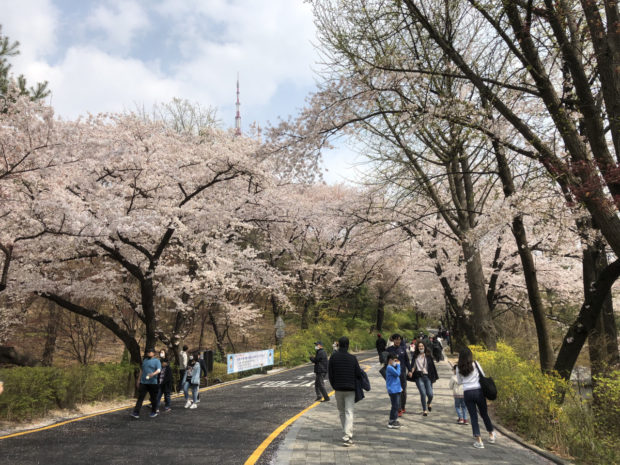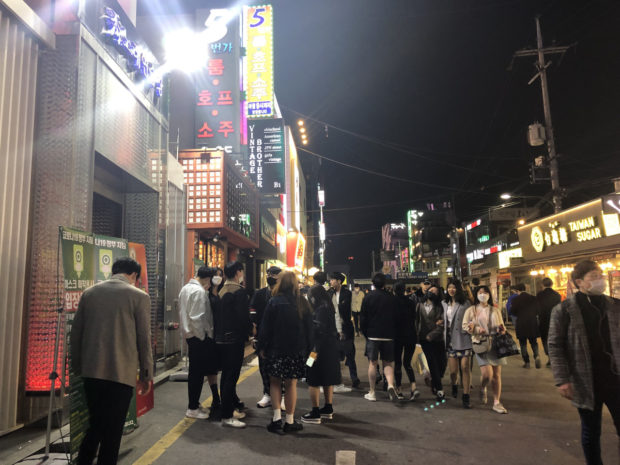Social distancing wanes in South Korea

People walk on a path lined with blossoming cherry trees leading to N Seoul Tower on Saturday afternoon. (Ock Hyun-ju/The Korea Herald)
SEOUL — As spring has arrived and the daily new infections of COVID-19 hovered around 30 in recent days, life in South Korea appears to be cautiously returning to normal with signs of social distancing waning.
Over the weekend, mountains and parks were packed with families, friends and couples seeking to take in the fleeting spring blossoms — with most of those venturing outside wearing masks.
Some churches resumed religious services over the Easter weekend and early voting was held through Saturday for Wednesday’s general election, drawing many people out of their homes.
“The weather is warm and flowers are in full bloom so I could not stay inside,” said Choo Kyo-woong, 62, who was walking on a trail leading to N Seoul Tower on Saturday afternoon with his wife.
Holding his mask in hand instead of wearing it, he said, “How can I keep the mask on if I wanted to smell the scent of the flowers?”
Article continues after this advertisementIt is not yet a time to be relaxed and ease up on social distancing rules, many told The Korea Herald, but they said it gets harder to keep themselves inside as the fight against coronavirus becomes further protracted.
Article continues after this advertisement“I am worried about getting infected, but I could not help but come outside for a stroll because I felt too confined. I was here last weekend too, and I can see so many more people today,” said Lee Yoon-kyuong, 41, walking up to the tower with her 9-year-old daughter.
It has been four weeks since the government began its rigorous social distancing campaign by urging the public to stay indoors and tightening restrictions on religious gatherings as well as sports and entertainment facilities on March 21.
Due in large part to such practices, the country had managed to flatten the virus curve. Korea reported its lowest daily increase of COVID-19 infections on Friday dating to Feb. 20, reporting only 27 new cases. Thirty and 32 new cases were reported on Saturday and Sunday, respectively.
The government, however, is still on alert with a continued influx of infections coming from overseas, small-scale outbreaks at enclosed places such as bars and hospitals and cases whose transmission routes remain unclear.
On Saturday, the area near Hongik University, a popular nightlife spot in Seoul, was vibrant, though all nightclubs were closed upon the Seoul Metropolitan Government’s orders and quarantine procedures have been made stricter before entry into bars and karaoke rooms.
“Things seem mostly normal, the streets weren’t quite as packed as before, but the restaurant was totally full,” said Rachel Ferree from the US, who went out to a wine bar with a friend in Hongdae on Saturday evening.
“Everyone is aware that coronavirus is still a thing, hence the masks and hand sanitizer, but things have definitely loosened up,” she said. “It 100 percent feels like it’s almost over here in Korea. No one was glaring at people without masks on, like I saw a couple weeks ago.”
There was a long line in front of a popular karaoke room in Hongdae with people waiting to put in their names and contact information. The signpost at the entrance read: “No entry without wearing a mask.”
As part of the tightened social distancing restrictions, entertainment facilities, indoor gyms and churches must follow the government’s quarantine rules, such as making customers maintain a 1-meter distance from each other. Those violating the rules can face a fine of up to 3 million won ($2,500).
In Seoul alone, some 2,146 entertainment establishments such as nightclubs, discos and escort bars were closed by an administrative order from local authorities.
At least 25 infections were linked to two bars in Seoul and one bar in Pyeongtaek, Gyeonggi Province, as of Sunday.
The slackening of social distancing has greatly worried health authorities.
“The number of new infections is decreasing, but it is not yet a time to feel relieved. If social distancing gets lax, there is still a risk of large outbreaks induced by enclosed environment and close contact,” Jung Eun-kyeong, director of the Korea Centers for Disease Control and Prevention, said at a briefing Sunday.
“We think that many were exposed (to the virus) this weekend, so those who show symptoms of fever, coughing and sore throat should refrain from going to work or outside and should stay home,” she said.
On Thursday she said Korea may be entering a period of “silent transmission.”
As public fatigue grows over prolonged social distancing, the government is preparing to transition to “routine safety measures” that would allow Koreans to lead their normal daily lives while fighting the virus spread. This week the government plans to release draft guidelines to gather opinions from the public.
For more news about the novel coronavirus click here.
What you need to know about Coronavirus.
For more information on COVID-19, call the DOH Hotline: (02) 86517800 local 1149/1150.
The Inquirer Foundation supports our healthcare frontliners and is still accepting cash donations to be deposited at Banco de Oro (BDO) current account #007960018860 or donate through PayMaya using this link.
